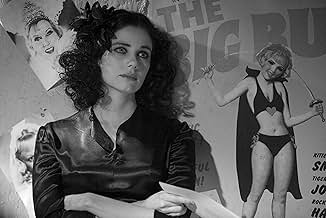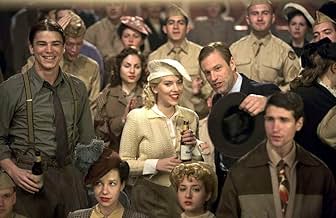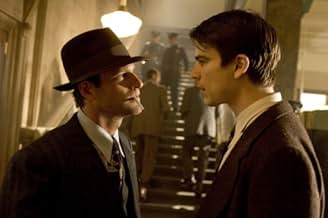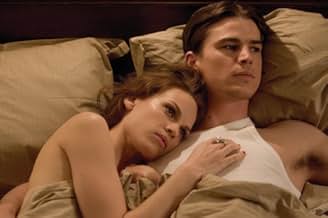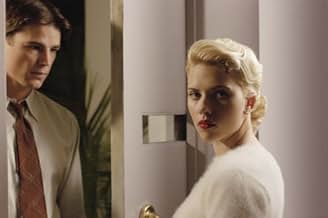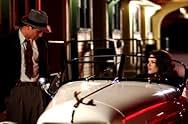IMDb रेटिंग
5.6/10
79 हज़ार
आपकी रेटिंग
ब्लैक डाहलिया एलिज़ाबेथ शार्ट की हत्या की जांच के परिणाम स्वरूप दो पुलिसकर्मी अपने व्यक्तिगत और पेशेवर जीवन को बिखरते हुए देखते हैं.ब्लैक डाहलिया एलिज़ाबेथ शार्ट की हत्या की जांच के परिणाम स्वरूप दो पुलिसकर्मी अपने व्यक्तिगत और पेशेवर जीवन को बिखरते हुए देखते हैं.ब्लैक डाहलिया एलिज़ाबेथ शार्ट की हत्या की जांच के परिणाम स्वरूप दो पुलिसकर्मी अपने व्यक्तिगत और पेशेवर जीवन को बिखरते हुए देखते हैं.
- निर्देशक
- लेखक
- स्टार
- 1 ऑस्कर के लिए नामांकित
- 4 जीत और कुल 16 नामांकन
Angus MacInnes
- Capt. John Tierney
- (as Angus MacInnis)
फ़ीचर्ड समीक्षाएं
Anybody expecting to get a great account of the Black Dahlia case, even fictional, will be disappointed going in to this movie. Of course, I knew that it was a fictionalization of the case, but I had no idea the movie would present its own evidence and draw its own conclusions.
But the main problem here is not the lack of factual detail, so much as the confusion of plot that surrounds and overwhelms the Black Dahlia case itself. So much plot and character and sideplots and backstory are built around the central characters that the case itself seems like a distraction. A key plot point and character motivator is the fascination of the two detectives with the murder, but this is never elaborated enough in the film, and we're left to half-heartedly guess at the character motivations.
The tone is never consistently campy, but when the camp arrives it overwhelms the story. A dinner scene between a suspect and her family had the crowd in stitches (the only scene during which the audience laughed). The problem is that the scene is valuable to the plot and should never have been played for laughs. Hitchcock or even Lynch could have shot the same scene, with the same events and dialogue, and made it menacing and creepy, which it needed to be to function in the mystery.
Other problems: De Palma uses the lesbian angle of the movie (never a part of the case) to full exploitative advantage, and the actresses seem unable to master to the expressive 1940s style acting that would have come naturally to even a marginal 40s star.
Although the film brings a clearcut finale rather than a vague puzzle, too many loose threads come together too neatly and rather than bringing the film to a satisfactory conclusion, it leaves you scratching your head, is this what I spent the last 2 hours waiting to hear? Overall, there is too much plot, too little character development and a wildly uneven tone. The movie has its moments but it's a blinding mess all together.
But the main problem here is not the lack of factual detail, so much as the confusion of plot that surrounds and overwhelms the Black Dahlia case itself. So much plot and character and sideplots and backstory are built around the central characters that the case itself seems like a distraction. A key plot point and character motivator is the fascination of the two detectives with the murder, but this is never elaborated enough in the film, and we're left to half-heartedly guess at the character motivations.
The tone is never consistently campy, but when the camp arrives it overwhelms the story. A dinner scene between a suspect and her family had the crowd in stitches (the only scene during which the audience laughed). The problem is that the scene is valuable to the plot and should never have been played for laughs. Hitchcock or even Lynch could have shot the same scene, with the same events and dialogue, and made it menacing and creepy, which it needed to be to function in the mystery.
Other problems: De Palma uses the lesbian angle of the movie (never a part of the case) to full exploitative advantage, and the actresses seem unable to master to the expressive 1940s style acting that would have come naturally to even a marginal 40s star.
Although the film brings a clearcut finale rather than a vague puzzle, too many loose threads come together too neatly and rather than bringing the film to a satisfactory conclusion, it leaves you scratching your head, is this what I spent the last 2 hours waiting to hear? Overall, there is too much plot, too little character development and a wildly uneven tone. The movie has its moments but it's a blinding mess all together.
I was disappointed in this film mainly because I love James Elroy's books and found that this film did not do it justice. The characters in the film became stereotypes or cardboard 40's characters. Scarlett Johannsen looked like a young Lana Turner on tranquilizers.........very little emotion, so much mumbling.............poor Hilary Swank was just too distracting in her black wig trying to be a 40's vamp ...........I guess we are not accustomed to seeing her that way and she evidently does not do well in sexy, seductive roles............Josh Hartnett did pretty well.........although the constant taking off of clothing of his different ladies seemed a bit tiresome......if I would have had this on video I would have fast forwarded the constant "clothes removal" scenes. James Ellroy also wrote LA Confidential and that was a masterpiece on film.........but of course, the actors were Russell Crowe, Kevin Spacey, Danny Divito, and many very well seasoned actors with a far above average script. Sorry to say that this film is not academy award material as LA Confidential was................Ellroy's stories can be told on film with good writing, competent acting, good casting, good screenplay and continuity. This was not present in The Black Dahlia. Actually, the girl who played The Black Dahlia was the most sensitive and sympathetic and portrayed her character excellently.
Now I like Brian DePalma, and I love Carrie, The Untouchables and Carlito's Way. Out of the films of his I've seen, The Black Dahlia is my least favourite in my view, though I was also rather disappointed in Scarface too.
I was really interested in its concept and the story seemed interesting. Also the film is very well made, with stylish cinematography and beautiful scenery, costumes, sets and makeup, DePalma's direction has occasional flashes of brilliance and the music was quite nice as well.
However, this is another case of style over substance. The script falls flat, with little idea of which direction to go, and the tone of the story is also uneven with some scenes disappointingly over-the top. The characters I felt indifferent to, and I also thought they were quite shallow and poorly explored, the pace is rather meandering and with exception of Fiona Shaw who's quite good the acting is bland. Also the ending I think is overdone.
All in all, interesting initially and while well made it is emotionally hollow and flat in its scripting and characterisation. 4/10 Bethany Cox
I was really interested in its concept and the story seemed interesting. Also the film is very well made, with stylish cinematography and beautiful scenery, costumes, sets and makeup, DePalma's direction has occasional flashes of brilliance and the music was quite nice as well.
However, this is another case of style over substance. The script falls flat, with little idea of which direction to go, and the tone of the story is also uneven with some scenes disappointingly over-the top. The characters I felt indifferent to, and I also thought they were quite shallow and poorly explored, the pace is rather meandering and with exception of Fiona Shaw who's quite good the acting is bland. Also the ending I think is overdone.
All in all, interesting initially and while well made it is emotionally hollow and flat in its scripting and characterisation. 4/10 Bethany Cox
De Palma's staged, theatrical style has always felt like an in-joke: an expressive homage (or sometimes a slap in the face) to the conventions of cinema. And in the case of his high- energy thrillers, the joke is funny and damned entertaining. But in the case of his dramas, De Palma constantly walks a thin line between evocative melodrama and camp (The wonderful "Carlito's Way," in my opinion, is the exception). And "The Black Dahlia" often steps over that line.
With a steady build-up of noir conventions, the film hearkens to the expressionistic film and acting styles of the 40's -- a style which can induce giggles in audiences raised on irony. And I can count a few musical swells, flamboyant acting choices and dramatic fade-outs which caused unwanted comic relief. Or did it? If there's one thing De Palma loves more than entertaining his audience, it's confounding them. How else do you explain the two-hour joke that was "Raising Cain"? (Although I, for one, found that particular joke damned funny).
You watch "Dahlia" with the distinct impression that De Palma is enjoying every minute of it. He's copying Wilder, Welles and, you guessed it, Hitchcock -- and he's having a blast doing it. So when Josh Hartnett's character pulls a full dinner setting (including the turkey) off a table and throws Scarlett Johansson down lustfully upon it, should we also smile and remember "Double Indemnity"? I guess it would help if you've seen "Double Indemnity."
That said, the film's biggest flaw is that it smiles at itself for so long that it leaves little time to wrap up the plot. The onslaught of last-reel revelations seems to exist only to give the actors more opportunity to relish in the delicious mood De Palma has created. We never really cared about the plot in the first place because De Palma didn't care about it either. He's more interested in the shadows, the thrills, the drama, the lurking killers, swelling music, lusty confrontations and blood splatters. And the plot points get lost somewhere in the mix. So who can blame us for glazing over when Hartnett finally starts to care about the mysteries rather than just being mystified by them? De Palma has painted such an odd, exciting picture (even when it turns to camp) that the audience would rather keep watching the elaborate set-ups than sit through the convoluted solutions.
But then again, what good is a joke without a satisfying punch line?
With a steady build-up of noir conventions, the film hearkens to the expressionistic film and acting styles of the 40's -- a style which can induce giggles in audiences raised on irony. And I can count a few musical swells, flamboyant acting choices and dramatic fade-outs which caused unwanted comic relief. Or did it? If there's one thing De Palma loves more than entertaining his audience, it's confounding them. How else do you explain the two-hour joke that was "Raising Cain"? (Although I, for one, found that particular joke damned funny).
You watch "Dahlia" with the distinct impression that De Palma is enjoying every minute of it. He's copying Wilder, Welles and, you guessed it, Hitchcock -- and he's having a blast doing it. So when Josh Hartnett's character pulls a full dinner setting (including the turkey) off a table and throws Scarlett Johansson down lustfully upon it, should we also smile and remember "Double Indemnity"? I guess it would help if you've seen "Double Indemnity."
That said, the film's biggest flaw is that it smiles at itself for so long that it leaves little time to wrap up the plot. The onslaught of last-reel revelations seems to exist only to give the actors more opportunity to relish in the delicious mood De Palma has created. We never really cared about the plot in the first place because De Palma didn't care about it either. He's more interested in the shadows, the thrills, the drama, the lurking killers, swelling music, lusty confrontations and blood splatters. And the plot points get lost somewhere in the mix. So who can blame us for glazing over when Hartnett finally starts to care about the mysteries rather than just being mystified by them? De Palma has painted such an odd, exciting picture (even when it turns to camp) that the audience would rather keep watching the elaborate set-ups than sit through the convoluted solutions.
But then again, what good is a joke without a satisfying punch line?
"For murder, though it have no tongue, will speak/With most miraculous organ." Shakespeare's Hamlet
Murders are messy on the screen and in real life; screenplays about them can be chaotic and disjointed also. Such is the case with Black Dahlia, a film noir from Brian De Palma, a past master of the macabre and the complicated (Blow Out, Body Double). It has all the trappings of a first-rate detective novel (James Ellroy) made into a 1940's thriller with appropriately moody music of the soulful trumpet (Mark Isham), lush production design (Dante Ferretti), and equally impressive costuming (Jenny Beavan), all set in a timelessly seedy Los Angeles.
There's also the conflicted, sometimes dark hero detective (Josh Hartnett) and the sexy, dangerous femme fatale (Hilary Swank), accompanied by the questionably good voluptuary sex bomb (Scarlett Johansson). As if these noir troublemakers were not enough, writer Josh Friedman seemingly adapts Ellroy's every subplot, every story thread, as if each had to be accounted for in the best CSI tradition.
The original novel was based on aspiring actress Elizabeth Short's unsolved grizzly murder in 1947. After a considerably convoluted exposition, with plot lines rarely intersecting in a unified way, the film has the nerve to offer one of the most extensive denouements in film history, could be a half hour, with lengthy explanation of how all those ends tied together. Needless to say, anti climaxes abound in this last segment, leaving not only more confusion about the plot but also a desire to get back to The Big Sleep without sleeping, a state Black Dahlia threatened several times.
Hartnett's detective says, "Nothing stays buried forever. Nothing." I say this weak noir wannabe should stay buried until a bright 22nd century scholar sees its cultural and aesthetic significance. Until then, it's a jumble of plot points resolved in the end by tedious narration. Even Scarlett Johansson's pulchritude couldn't win me, and that's murder in the first degree.
Murders are messy on the screen and in real life; screenplays about them can be chaotic and disjointed also. Such is the case with Black Dahlia, a film noir from Brian De Palma, a past master of the macabre and the complicated (Blow Out, Body Double). It has all the trappings of a first-rate detective novel (James Ellroy) made into a 1940's thriller with appropriately moody music of the soulful trumpet (Mark Isham), lush production design (Dante Ferretti), and equally impressive costuming (Jenny Beavan), all set in a timelessly seedy Los Angeles.
There's also the conflicted, sometimes dark hero detective (Josh Hartnett) and the sexy, dangerous femme fatale (Hilary Swank), accompanied by the questionably good voluptuary sex bomb (Scarlett Johansson). As if these noir troublemakers were not enough, writer Josh Friedman seemingly adapts Ellroy's every subplot, every story thread, as if each had to be accounted for in the best CSI tradition.
The original novel was based on aspiring actress Elizabeth Short's unsolved grizzly murder in 1947. After a considerably convoluted exposition, with plot lines rarely intersecting in a unified way, the film has the nerve to offer one of the most extensive denouements in film history, could be a half hour, with lengthy explanation of how all those ends tied together. Needless to say, anti climaxes abound in this last segment, leaving not only more confusion about the plot but also a desire to get back to The Big Sleep without sleeping, a state Black Dahlia threatened several times.
Hartnett's detective says, "Nothing stays buried forever. Nothing." I say this weak noir wannabe should stay buried until a bright 22nd century scholar sees its cultural and aesthetic significance. Until then, it's a jumble of plot points resolved in the end by tedious narration. Even Scarlett Johansson's pulchritude couldn't win me, and that's murder in the first degree.
क्या आपको पता है
- ट्रिवियाWhen Dwight "Bucky" Bleichert goes searching through some photographs, you can see a real autopsy photo of Elizabeth Short.
- गूफ़When Bucky Bleichert enters Sheryl Saddon's bedroom to get the suitcase, there is a postcard-sized picture of Bettie Page on the wall. Bettie Page did not start modeling until 1950.
- भाव
Emmet Linscott: What kind of name is Bleichert? Dutch?
Ofcr. Dwight "Bucky" Bleichert: German.
Emmet Linscott: Ah, a great people, the Germans. Hitler was a bit excessive. But mark my words that someday we'll regret not joining forces with him to fight the Reds.
- साउंडट्रैकIn the Mood
Written by Joe Garland (as Joseph C. Garland)
Used by Permission of Shapiro Bernstein & Co. Inc. (ASCAP)
टॉप पसंद
रेटिंग देने के लिए साइन-इन करें और वैयक्तिकृत सुझावों के लिए वॉचलिस्ट करें
विवरण
- रिलीज़ की तारीख़
- कंट्री ऑफ़ ओरिजिन
- भाषाएं
- इस रूप में भी जाना जाता है
- La Dalia Negra
- फ़िल्माने की जगहें
- उत्पादन कंपनियां
- IMDbPro पर और कंपनी क्रेडिट देखें
बॉक्स ऑफ़िस
- बजट
- $5,00,00,000(अनुमानित)
- US और कनाडा में सकल
- $2,25,45,080
- US और कनाडा में पहले सप्ताह में कुल कमाई
- $1,00,05,895
- 17 सित॰ 2006
- दुनिया भर में सकल
- $4,93,32,692
- चलने की अवधि
- 2 घं 1 मि(121 min)
- रंग
- ध्वनि मिश्रण
- पक्ष अनुपात
- 2.35 : 1
इस पेज में योगदान दें
किसी बदलाव का सुझाव दें या अनुपलब्ध कॉन्टेंट जोड़ें







